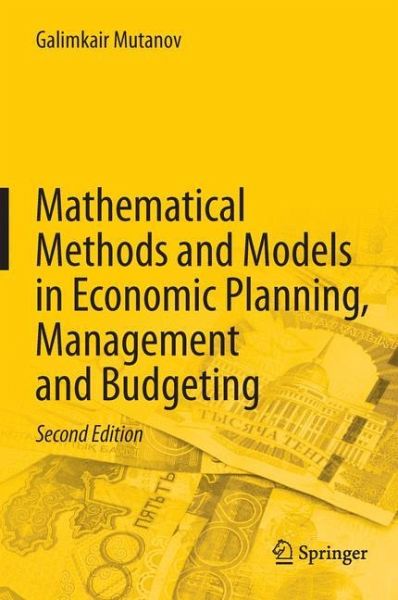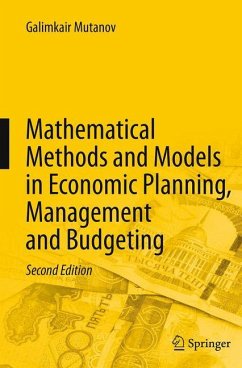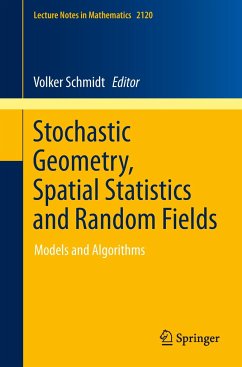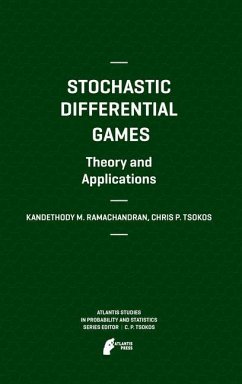
Mathematical Methods and Models in Economic Planning, Management and Budgeting
Versandkostenfrei!
Versandfertig in 6-10 Tagen
98,99 €
inkl. MwSt.
Weitere Ausgaben:

PAYBACK Punkte
49 °P sammeln!
This book describes a system of mathematical models and methods that can be used to analyze real economic and managerial decisions and to improve their effectiveness. Application areas include: management of development and operation budgets, assessment and management of economic systems using an energy entropy approach, equation of exchange rates and forecasting foreign exchange operations, evaluation of innovative projects, monitoring of governmental programs, risk management of investment processes, decisions on the allocation of resources, and identification of competitive industrial clust...
This book describes a system of mathematical models and methods that can be used to analyze real economic and managerial decisions and to improve their effectiveness. Application areas include: management of development and operation budgets, assessment and management of economic systems using an energy entropy approach, equation of exchange rates and forecasting foreign exchange operations, evaluation of innovative projects, monitoring of governmental programs, risk management of investment processes, decisions on the allocation of resources, and identification of competitive industrial clusters. The proposed methods and models were tested on the example of Kazakhstan's economy, but the generated solutions will be useful for applications at other levels and in other countries.
Regarding your book "Mathematical Methods and Models in Economics", I am impressed because now it is time when "econometrics" is becoming more appreciated by economists and by schools that are the hostsor employers of modern economists. ... Your presented results really impressed me.
John F. Nash, Jr., Princeton University, Nobel Memorial Prize in Economic Sciences
The book is within my scope of interest because of its novelty and practicality.
First, there is a need for realistic modeling of complex systems, both natural and artificial that conclude computer and economic systems. There has been an ongoing effort in developing models dealing with complexity and incomplete knowledge. Consequently, it is clear to recognize the contribution of Mutanov to encapsulate economic modeling with emphasis on budgeting and innovation.
Secondly, the method proposed by Mutanov has been verified by applying to the case of the Republic of Kazakhstan, with her vibrant emerging economy.
Thirdly, Chapter 5 of the book is of particular interest for the computer technology community because it deals with innovation.
In summary, the book of Mutanov should become one of the outstanding recognized pragmatic guides for dealing with innovative systems.
Andrzej Rucinski, University of New Hampshire
This book is unique in its theoretical findings and practical applicability. The book is an illuminating study based on an applied mathematical model which uses methods such as linear programming and input-output analysis. Moreover, this work demonstrates the author's great insight and academic brilliance in the fields of finance, technological innovations and marketing vis-à-vis the market economy. From both theoretical and practical standpoint, this work is indeed a great achievement.
Yeon Cheon Oh, President of Seoul National University
Regarding your book "Mathematical Methods and Models in Economics", I am impressed because now it is time when "econometrics" is becoming more appreciated by economists and by schools that are the hostsor employers of modern economists. ... Your presented results really impressed me.
John F. Nash, Jr., Princeton University, Nobel Memorial Prize in Economic Sciences
The book is within my scope of interest because of its novelty and practicality.
First, there is a need for realistic modeling of complex systems, both natural and artificial that conclude computer and economic systems. There has been an ongoing effort in developing models dealing with complexity and incomplete knowledge. Consequently, it is clear to recognize the contribution of Mutanov to encapsulate economic modeling with emphasis on budgeting and innovation.
Secondly, the method proposed by Mutanov has been verified by applying to the case of the Republic of Kazakhstan, with her vibrant emerging economy.
Thirdly, Chapter 5 of the book is of particular interest for the computer technology community because it deals with innovation.
In summary, the book of Mutanov should become one of the outstanding recognized pragmatic guides for dealing with innovative systems.
Andrzej Rucinski, University of New Hampshire
This book is unique in its theoretical findings and practical applicability. The book is an illuminating study based on an applied mathematical model which uses methods such as linear programming and input-output analysis. Moreover, this work demonstrates the author's great insight and academic brilliance in the fields of finance, technological innovations and marketing vis-à-vis the market economy. From both theoretical and practical standpoint, this work is indeed a great achievement.
Yeon Cheon Oh, President of Seoul National University















